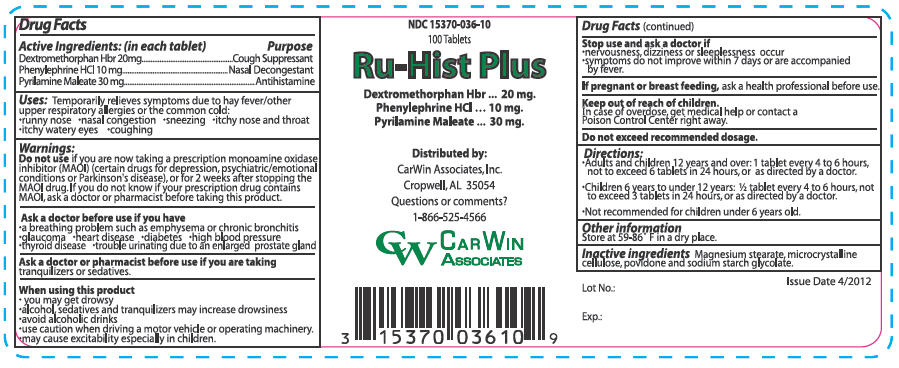
Ru-hist Plus | Pyrilamine Maleate, Phenylephrine Hydrochloride, And Dextromethorphan Tablet while Breastfeeding
What is Ru-hist Plus | Pyrilamine Maleate, Phenylephrine Hydrochloride, And Dextromethorphan Tablet ?
Purpose: Active Ingredients: (in each tablet) Purpose Dextromethorphan Hbr 20mg Cough Suppressant Phenylephrine HCl 10 mg Nasal Decongestant Pyrilamine Maleate 30 mg Antihistamine
Can I use Ru-hist Plus | Pyrilamine Maleate, Phenylephrine Hydrochloride, And Dextromethorphan Tablet while breastfeeding?

Ru-hist Plus | Pyrilamine Maleate, Phenylephrine Hydrochloride, And Dextromethorphan Tablet Breastfeeding Analsys
Pyrilamine maleate while Breastfeeding
Low RiskCAS Number: 59-33-6
First generation antihistamine with sedative and important antimuscarinic effects. Such remarkable anticholinergic effect may inhibit lactation. At latest update no published data on excretion into breast milk were found. Drug with poor scientific support which is marketed in very few countries.Marketed as part of in many “at the counter” compounds in association poliasociación with expectorants, bronchodilators, antitussives, etc. Avoid the use of drug associations mostly while breastfeeding. Although occasional and moderate use during lactation would probably not pose a serious risk, a safer alternative should be preferred until more data on this drug related to breastfeeding is available. Topically used on the skin, it would not represent a risk during breastfeeding. Avoid applying it on the breast. Assess the child for drowsiness and inappropriate infant feeding.It is not recommended bed-sharing with your baby if you are on this medication.
Phenylephrine hydrochloride while Breastfeeding
Low RiskCAS Number: 59-42-7
Used on topical decongestant solutions for nose drops at low concentration. 10% midriatic eye drops are available. Because low concentration is used on nose and ophtalmic drops a significant excretion into breast milk is unlikely. Low oral biodisponibility minimizes any risk of harmful effect in the infant. Authorized for nasal or ophtalmic use on children aged younger than 1 year. Although on latest update relevant data on breastfeeding was not found it is considered to be safe when minimal dose is used. Avoid excessive or long term use. A related drug Pseudoephedrine can inhibit milk production. It would be advisable to press on the lachrimal sac to minimize absorption.
Dextromethorphan hydrobromide while Breastfeeding
SafeCAS Number: 125-71-3
Cough suppressant related with morphine and codeine which is lacking of analgesic or sedative properties. Commonly prescribed by pediatricians. On latest update relevant data on breastfeeding was not found. Because reported low toxicity and mild side effect it is considered to be safe while breastfeeding. Frequently associated to caffeine and other products that are usually compatible with breastfeeding. Avoid use of multiple drug and alcohol containing medication.
Ru-hist Plus | Pyrilamine Maleate, Phenylephrine Hydrochloride, And Dextromethorphan Tablet Breastfeeding Analsys - 2
Phenylephrine hydrochloride while Breastfeeding
CAS Number: 59-42-7
The oral bioavailability of phenylephrine is only about 40%,[1] so the drug is unlikely to reach the infant in large amounts. However, intravenous or oral administration of phenylephrine might decrease milk production. Because no information is available on the use of oral phenylephrine during breastfeeding, an alternate drug may be preferred, especially while nursing a newborn or preterm infant.Phenylephrine nasal spray or ophthalmic drops are less likely to decrease lactation. To substantially diminish the effect of the drug after using eye drops, place pressure over the tear duct by the corner of the eye for 1 minute or more, then remove the excess solution with an absorbent tissue.
Dextromethorphan hydrobromide while Breastfeeding
CAS Number: 125-71-3
Neither the excretion of dextromethorphan in milk nor its effect on breastfed infants have been studied. It is unlikely that with usual maternal doses amounts in breastmilk would harm the nursing infant, especially in infants over 2 months of age. It is best to avoid the use of products with a high alcohol content while nursing.
What if I already have used Ru-hist Plus | Pyrilamine Maleate, Phenylephrine Hydrochloride, And Dextromethorphan Tablet?
Ru-hist Plus | Pyrilamine Maleate, Phenylephrine Hydrochloride, And Dextromethorphan Tablet is in the category of low risk, if you have already used it then its not a big deal if health and behavior of baby is good. However your health care provider shall be aware of the fact that you have used Ru-hist Plus | Pyrilamine Maleate, Phenylephrine Hydrochloride, And Dextromethorphan Tablet so you should inform him based on your convenience.
My doctor has prescribed me Ru-hist Plus | Pyrilamine Maleate, Phenylephrine Hydrochloride, And Dextromethorphan Tablet, what should I do?
Though Ru-hist Plus | Pyrilamine Maleate, Phenylephrine Hydrochloride, And Dextromethorphan Tablet dose not comes in category of safe drugs rather it comes in category of low risk but if your doctor is aware that you are breastfeeding your baby and has still recommended it then its advantages must be outweighing the risks.
If I am using Ru-hist Plus | Pyrilamine Maleate, Phenylephrine Hydrochloride, And Dextromethorphan Tablet, will my baby need extra monitoring?
Not much monitoring required while using Ru-hist Plus | Pyrilamine Maleate, Phenylephrine Hydrochloride, And Dextromethorphan Tablet
Who can I talk to if I have questions about usage of Ru-hist Plus | Pyrilamine Maleate, Phenylephrine Hydrochloride, And Dextromethorphan Tablet in breastfeeding?
US
National Womens Health and Breastfeeding Helpline: 800-994-9662 (TDD 888-220-5446) 9 a.m. and 6 p.m. ET, Monday through Friday
UK
National Breastfeeding Helpline: 0300-100-0212 9.30am to 9.30pm, daily
Association of Breastfeeding Mothers: 0300-330-5453
La Leche League: 0345-120-2918
The Breastfeeding Network supporter line in Bengali and Sylheti: 0300-456-2421
National Childbirth Trust (NCT): 0300-330-0700
Australia
National Breastfeeding Helpline: 1800-686-268 24 hours a day, 7 days a week
Canada
Telehealth Ontario for breastfeeding: 1-866-797-0000 24 hours a day, 7 days a week
